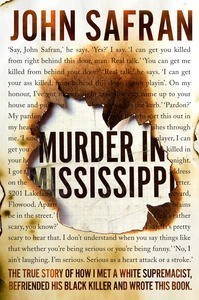What do you think?
Rate this book


368 pages, Paperback
First published September 1, 2013

 come to my blog!
come to my blog!“If Vincent killed a white supremacist, fighting racism, he can be the hero in that story. If Vincent killed a gay man for hitting on him, that doesn’t work anymore. I wanted the narrative to be me and the brave McGee family against ‘the system’. I wanted to be hanging with the black activist lawyers, but they’ve cut me off. Worse, I got on smashingly with Jim, the white supremacist.”
My feet squelch on my untied shoelaces as I jerk my luggage across the car park at Jackson-Medgar Wiley Evers International Airport.Despite the titillating suggestion that Vincent McGee's murder of Richard Barrett was prompted by a gay overture, Safran ultimately wastes a large chunk of the book in chasing this story. Fans of Jon Ronson or true crime should find better ways to spend their precious reading time.
Mississippi doesn't waste any time. That Jackson is President Andrew Jackson, pro-slavery campaigner and master to three hundred slaves. That Medgar Wiley Evers was a black activist who collapsed and died outside his house in 1963 after a Kansman had shot him in the back. You land straight in a race war.
And Mississippi wants to get something else out in the open, too. Tennessee Williams is looking down at me like I'm a piece of dirt. John Grisham wants to stab me. William Faulkner sneers.
YES, WE CAN READ, says the headline on the welcome billboard. A FEW OF US CAN EVEN WRITE.
Way to try to psyche me out, Mississippi. Why not just put up a sign: John, a book is a little more difficult than a comedy TV show? All up, a dozen Mississippi writers scorn me from the billboard, glowing in the night, as I steer out of the airport.